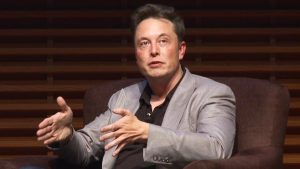Musk's comments raise concerns about editorial neutrality and bias in major online platforms.
Elon Musk Targets Wikipedia Over Alleged Bias in Editing Practices

Elon Musk Targets Wikipedia Over Alleged Bias in Editing Practices
Billionaire challenges support for Wikipedia, calling it “Wokepedia” as ideology debates ignite.
Elon Musk has boldly entered into a new confrontation, this time with Wikipedia, the widely utilized online encyclopedia. The billionaire recently called on his followers on X to halt their donations to the Wikimedia Foundation until he believes they can "restore balance to their editing authority." Musk's remarks, labeling Wikipedia "Wokepedia," have reignited longstanding discussions surrounding the platform’s supposed ideological bias.
His comments were sparked by a graph circulating on X, taken from Wikipedia's annual report, which indicated that 29% of the budget was directed towards “equity” and “safety & inclusion” initiatives. Critics, including Musk, suggest that these funding priorities exacerbate a perceived broader agenda affecting Wikipedia's editorial integrity.
In a tweet, Musk stated: "Stop donating to Wokepedia until they restore balance to their editing authority," further emphasizing his call for accountability (https://t.co/sHjnFTtN5y).
The debate over Wikipedia’s supposed bias is supported by various studies. Research led by David Rozado, associate professor of computational science at Otago Polytechnic in New Zealand, revealed inconsistencies in the portrayal of political figures. According to Newsweek, Rozado concluded that Wikipedia tends to depict right-leaning figures in a more negative light compared to those on the left.
Nevertheless, the discussion remains contentious. Jimmy Wales, co-founder of Wikipedia, has persistently denied allegations of a leftist bias, defending the platform’s aim for neutrality. Supporters assert that claims about Wikipedia being "woke" are anecdotal and overlook the intricate nature of collaborative editing.
Musk's criticism has elicited a variety of reactions online. Some supporters have praised his initiative for greater accountability, while others question whether his advocacy for “neutrality” is merely a front for his own beliefs. Regardless of the ongoing controversy, Musk's statements have reinstated focus on the pressing issues of neutrality and transparency faced by significant platforms like Wikipedia.
As this debate progresses, it highlights the broader challenge of bias in digital platforms and the necessity of maintaining balanced information in an increasingly polarized environment. Given Wikipedia’s key role as a source for global knowledge, this situation is bound to remain under scrutiny from both its critics and supporters.
His comments were sparked by a graph circulating on X, taken from Wikipedia's annual report, which indicated that 29% of the budget was directed towards “equity” and “safety & inclusion” initiatives. Critics, including Musk, suggest that these funding priorities exacerbate a perceived broader agenda affecting Wikipedia's editorial integrity.
In a tweet, Musk stated: "Stop donating to Wokepedia until they restore balance to their editing authority," further emphasizing his call for accountability (https://t.co/sHjnFTtN5y).
The debate over Wikipedia’s supposed bias is supported by various studies. Research led by David Rozado, associate professor of computational science at Otago Polytechnic in New Zealand, revealed inconsistencies in the portrayal of political figures. According to Newsweek, Rozado concluded that Wikipedia tends to depict right-leaning figures in a more negative light compared to those on the left.
Nevertheless, the discussion remains contentious. Jimmy Wales, co-founder of Wikipedia, has persistently denied allegations of a leftist bias, defending the platform’s aim for neutrality. Supporters assert that claims about Wikipedia being "woke" are anecdotal and overlook the intricate nature of collaborative editing.
Musk's criticism has elicited a variety of reactions online. Some supporters have praised his initiative for greater accountability, while others question whether his advocacy for “neutrality” is merely a front for his own beliefs. Regardless of the ongoing controversy, Musk's statements have reinstated focus on the pressing issues of neutrality and transparency faced by significant platforms like Wikipedia.
As this debate progresses, it highlights the broader challenge of bias in digital platforms and the necessity of maintaining balanced information in an increasingly polarized environment. Given Wikipedia’s key role as a source for global knowledge, this situation is bound to remain under scrutiny from both its critics and supporters.



















